Related Research Articles

Blood on the Tracks is the fifteenth studio album by American singer-songwriter Bob Dylan, released on January 20, 1975, by Columbia Records. The album marked Dylan's return to Columbia after a two-album stint with Asylum Records. Dylan began recording the album at an A & R studio in New York City in September 1974. In December, shortly before Columbia was due to release the album, Dylan abruptly re-recorded much of the material in Sound 80 studio in Minneapolis. The final album contains five tracks recorded in New York and five from Minneapolis. The album’s songs have been linked to tensions in Dylan's personal life, including his estrangement from his then-wife Sara. One of their children, Jakob Dylan, has described the songs as "my parents talking." In interviews, Dylan has denied that the songs on the album are autobiographical.
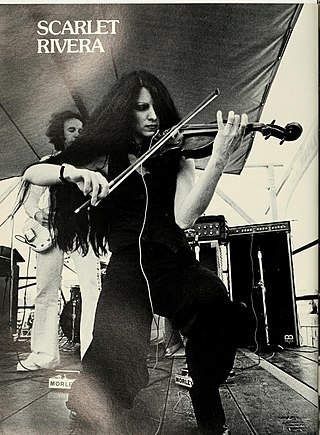
Donna Shea, better known as Scarlet Rivera is an American violinist. She is best known for her work with Bob Dylan, in particular on his 1976 album Desire and as part of the Rolling Thunder Revue.
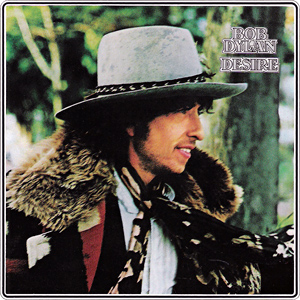
Desire is the seventeenth studio album by American singer-songwriter Bob Dylan, released on January 5, 1976, through Columbia Records. It is one of Dylan's most collaborative efforts, featuring the same caravan of musicians as the acclaimed Rolling Thunder Revue tours the previous year. Many of the songs also featured backing vocals by Emmylou Harris and Ronee Blakley. Most of the album was co-written by Jacques Levy, and is composed of lengthy story-songs, two of which quickly generated controversy: the 11-minute-long "Joey", which is seen as glorifying the violent gangster "Crazy Joey" Gallo, and "Hurricane", the opening track that tells a passionate account of the murder case against boxer Rubin Carter, who the song asserts was framed. Carter was released in 1985, after a judge overturned his conviction on appeal.
"The Lonesome Death of Hattie Carroll" is a topical song written by the American musician Bob Dylan. Recorded on October 23, 1963, the song was released on Dylan's 1964 album The Times They Are a-Changin' and gives a generally factual account of the killing of a 51-year-old African-American barmaid, Hattie Carroll, by then 24-year-old William Devereux "Billy" Zantzinger, a young man from a wealthy white tobacco farming family in Charles County, Maryland, and of his subsequent sentence to six months in a county jail, after being convicted of assault.

Renaldo and Clara is a 1978 American film directed by Bob Dylan and starring Bob Dylan, Sara Dylan and Joan Baez. Written by Dylan and Sam Shepard, the film incorporates three distinct film genres: concert footage, documentary interviews, and dramatic fictional vignettes reflective of Dylan's song lyrics and life.

Hard Rain is a live album by American singer-songwriter Bob Dylan, released on September 13, 1976 by Columbia Records. The album was recorded during the second leg of the Rolling Thunder Revue.

The Rolling Thunder Revue was a 1975–76 concert tour by American singer-songwriter Bob Dylan with numerous musicians and collaborators. The purpose of the tour was to allow Dylan, who was a major recording artist and concert performer, to play in smaller auditoriums in less populated cities where he could be more intimate with his audiences.

The Bootleg Series Vol. 5: Bob Dylan Live 1975, The Rolling Thunder Revue is a live album by Bob Dylan released by Columbia Records in 2002. The third installment in the ongoing Bob Dylan Bootleg Series on Legacy Records, it documents the Rolling Thunder Revue led by Dylan prior to the release of the album Desire. Until the release of this album, the only official live documentation of the Rolling Thunder Revue was Hard Rain, recorded during the less critically well received second leg of the tour.
Sara Dylan is an American former actress and model who was the first wife of singer-songwriter Bob Dylan. In 1959, Noznisky married magazine photographer Hans Lownds; during their marriage, she was known as Sara Lownds.
"Idiot Wind" is a song by Bob Dylan, which appeared on his 1975 album Blood on the Tracks. He began writing it in the summer of 1974, after his comeback tour with The Band. Dylan recorded the song in September 1974 and re-recorded it in December 1974 along with other songs on his album Blood on the Tracks. Between the recordings, he often reworked the lyrics. A live version of the song was released on Dylan's 1976 album Hard Rain, and all of the studio outtakes from the September sessions were released on the deluxe edition of The Bootleg Series Vol. 14: More Blood, More Tracks in 2018.
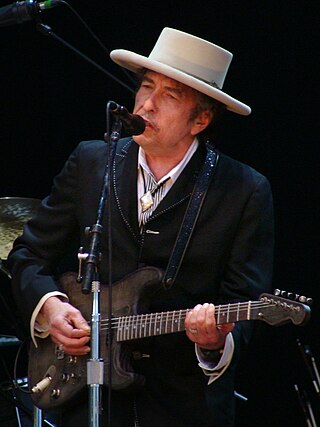
Bob Dylan is an American singer-songwriter. Generally regarded as one of the greatest songwriters ever, Dylan has been a major figure in popular culture over his 60-year career. Much of his most celebrated work dates from the 1960s, when songs such as "Blowin' in the Wind" (1963) and "The Times They Are a-Changin'" (1964) became anthems for the civil rights and antiwar movements. His lyrics during this period incorporated political, social, philosophical, and literary influences, defying pop music conventions and appealing to the burgeoning counterculture.
"It's Alright, Ma " is a song written and performed by American singer-songwriter Bob Dylan and first released on his 1965 album Bringing It All Back Home. It was written in the summer of 1964, first performed live on October 10, 1964, and recorded on January 15, 1965. It is described by Dylan biographer Howard Sounes as a "grim masterpiece".

Howard Pyle Wyeth, also known as Howie Wyeth, was an American drummer and pianist. Wyeth is remembered for work with the saxophonist James Moody, the rockabilly singer Robert Gordon, the electric guitarist Link Wray, the rhythm and blues singer Don Covay, and the folk singer Christine Lavin. Best known as a drummer for Bob Dylan, he was a member of the Wyeth family of American artists.
"It Takes a Lot to Laugh, It Takes a Train to Cry" is a song written by Bob Dylan, that was originally released on his album Highway 61 Revisited. It was recorded on July 29, 1965. The song was also included on an early, European Dylan compilation album entitled Bob Dylan's Greatest Hits 2.

"Watching the River Flow" is a blues rock song by American singer Bob Dylan. Produced by Leon Russell, it was written and recorded during a session in March 1971 at the Blue Rock Studio in New York City. The collaboration with Russell formed in part through Dylan's desire for a new sound—after a period of immersion in country rock music—and for a change from his previous producer.
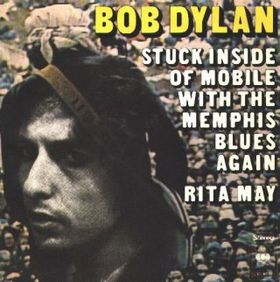
"Rita May" is a song by Bob Dylan, originally recorded during the sessions for the album Desire, but released only as the B-side of a single and on the compilation album, Masterpieces. The song is based on the 1957 rockabilly song "Bertha Lou". Some listeners believe that the lyrics of the song refer to writer Rita Mae Brown, who had complained of the lack of opportunities for casual lesbian sex.
"Romance in Durango" is the seventh song on Bob Dylan's 1976 album Desire. It was written by Dylan and Jacques Levy, who collaborated with Dylan on most of the songs on the album. The chorus contains several lines sung in Spanish, resulting in the song being released as a single in Spain in 1977. It was also released as a b-side to the Japanese single of "One More Cup of Coffee" in 1976. The song was produced by Don DeVito.
"Mama, You Been on My Mind" is a song by American singer-songwriter Bob Dylan. Written in 1964 during a trip to Europe, the song dealt with his recent breakup with his girlfriend, Suze Rotolo. Dylan first recorded the song in June of that year during a session for his album Another Side of Bob Dylan. However, the song was not included on the album, and Dylan's version remained unreleased until 1991. In total, in the 1990s and 2000s four versions were put out on Dylan's Bootleg Series of releases, including two live performances with Joan Baez from 1964 and 1975.
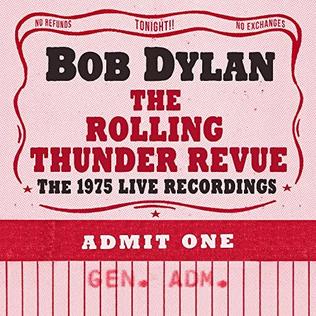
Bob Dylan – The Rolling Thunder Revue: The 1975 Live Recordings is a box set of 1975 live recordings by Bob Dylan, released on June 7, 2019. For this tour, Dylan assembled a loose collective of a backing band called Guam and played across North America for several dozen shows. The tie-in Netflix documentary film Rolling Thunder Revue: A Bob Dylan Story by Martin Scorsese was released the following week. A similar compilation was released in 2002 entitled Bob Dylan Live 1975, The Rolling Thunder Revue, as part of Dylan's ongoing Bootleg Series. That compilation was re-released on vinyl as a companion to the later release.

"One More Cup of Coffee (Valley Below)" is a song by American singer-songwriter Bob Dylan, which was released as the fourth track on his seventeenth studio album Desire (1976). The song was written by Dylan, and produced by Don DeVito. The album version of "One More Cup of Coffee (Valley Below)" was recorded on July 30, 1975, and released on Desire in January 1976. Dylan said the song was influenced by his visit to a Romani celebration at Saintes-Maries-de-la-Mer in France on his 34th birthday.
References
- ↑ "Sara | The Official Bob Dylan Site". www.bobdylan.com. Retrieved July 12, 2018.
- ↑ Kirell, Andrew (January 31, 2016). "'Desire': Bob Dylan's Sloppiest Masterpiece Turns 40". The Daily Beast. Retrieved July 12, 2018.
- 1 2 Margotin, Philippe; Guesdon, Jean-Michel (October 27, 2015). Bob Dylan All the Songs: The Story Behind Every Track. Running Press. pp. Sara. ISBN 9780316353533.
- 1 2 "Bob Dylan: Stories of the songs". The Independent. Retrieved July 12, 2018.
- 1 2 Sounes, Howard (2001). Down The Highway: The Life of Bob Dylan (New York, Grove, 2001). New York: Grove Press.
- ↑ Bob Dylan: The Recording Sessions by Clinton Heylin, p. 114.
- ↑ Gill, Andy (1998). My back pages : classic Bob Dylan, 1962–1969. London: Carlton. pp. 106–107. ISBN 1858684811. OCLC 42406935.
- ↑ "Future of New York's Chelsea Hotel hangs in the balance". Daily Telegraph. August 2, 2011. ISSN 0307-1235 . Retrieved July 12, 2018.
- ↑ Hoby, Hermione (December 19, 2010). "The 10 best Chelsea hotel moments". The Guardian. ISSN 0261-3077 . Retrieved July 12, 2018.
- ↑ Gray, Michael (2006). The Bob Dylan encyclopedia . New York: Continuum. pp. 198–201. ISBN 0826469337. OCLC 67346197.
- ↑ Reiff, Corbin. "With Blood on the Tracks, Bob Dylan bid an angry, ragged farewell to his wife". Music. Retrieved July 12, 2018.
- ↑ "A taste of Bob Dylan: 10 songs to beat The Band". The Irish Times. Retrieved July 12, 2018.
- ↑ Doyle, Patrick (January 5, 2016). "Bob Dylan's 'Desire': An 'Exotic' Masterpiece Turns 40". Rolling Stone. Retrieved July 12, 2018.
- ↑ "100 Greatest Bob Dylan Songs". Rolling Stone. May 24, 2016. Retrieved July 12, 2018.
- ↑ "The Bootleg Series, Vol. 5: Bob Dylan Live 1975 – The Rolling Thunder Revue – Bob Dylan | Songs, Reviews, Credits | AllMusic". AllMusic. Retrieved July 12, 2018.
- ↑ Original Seeds Vol. 2: Songs that inspired Nick Cave & the Bad Seeds, Kim Beissel, CD liner notes, Rubber Records Australia, 2004